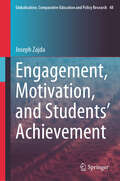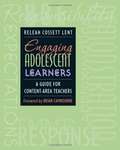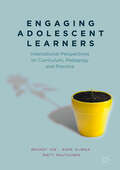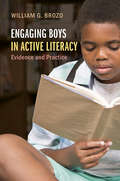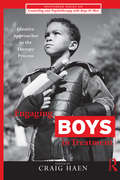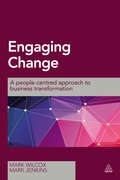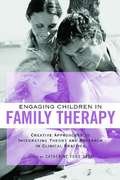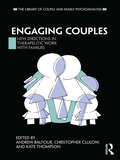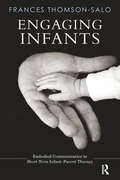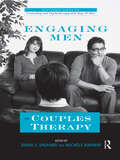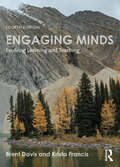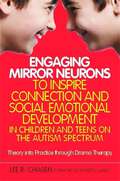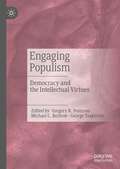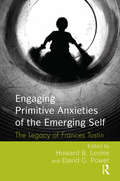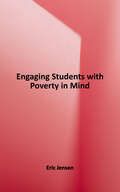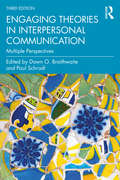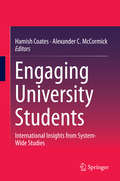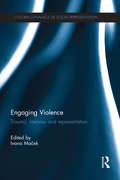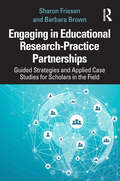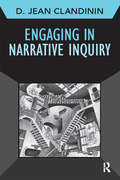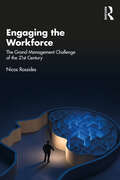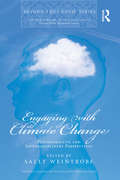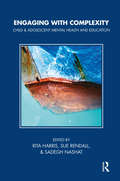- Table View
- List View
Engagement, Motivation, and Students’ Achievement (Globalisation, Comparative Education and Policy Research #48)
by Joseph ZajdaThis book analyses discourses of the use of engagement and motivation in schools globally. It focuses on the overall impact of engagement on teachers, students’ motivation, students’ well-being, and standards. It examines the role of engagement and motivation impacting teachers and students in the classroom, and the overall impact of inclusive classroom models to improve their performance in the classroom. The book analyses topics such as cultural identities and engagement, students’ personalities and their impact on learning, the role of intelligence in learning, social learning, engagement in collaborative groups, and teachers’ role in promoting engagement in the classroom. The book contributes in a very scholarly way, to a more holistic understanding of the nexus between globalisation, dominant models of motivation, and students’ engaging learning environments, and their academic achievement.
Engaging Adolescent Learners: A Guide for Content-area Teachers
by Releah Cossett LentExamine what it means to engage young adults in their learning and find out what classrooms with engaged students look, sound, and feel like. Let Releah Lent help you transform your classrooms into places where students have the freedom to satisfy their natural inclination to explore. With Engaging Adolescent Learners at your side, you'll have everything you need to help even the most reluctant students find a way to learn that works for them.
Engaging Adolescent Learners: International Perspectives on Curriculum, Pedagogy and Practice
by Brandy Yee Anne Sliwka Matti RautiainenThis book draws on detailed case studies from three very different countries and school systems to explore the early adolescent learner and the middle years of learning, both of which are often overlooked in the literature. An abundance of research shows the importance of the middle years in putting early adolescent learners on the path to success in further education, careers, and general wellbeing. By focusing on bringing current research to life through the sharing of practical examples and lived experiences of practitioners, this book explores how issues such as curriculum reform, inclusive philosophies, instructional design, and assessment practices are supporting the conditions in which effective middle years learning can unfold. A comparative approach, using data from Canada, Germany and Finland, is utilized to critically examine the effects of the pedagogical methods employed by teachers, and the learning environments in which formal education takes place. The book makes a compelling case for the importance of fostering student voice and choice, and developing new ways of engaging the school community as a whole, and makes a valuable contribution to the discourse concerning early adolescent learners and the middle years of schooling.
Engaging Boys in Active Literacy: Evidence and Practice
by William G. BrozoToo many boys do not like to read, are choosing not to read, and are suffering academically as a result. All concerned adults need to redouble their efforts to ensure that boys who bring the greatest challenges to our classrooms and schools receive responsive literacy texts and practices to increase their chances for academic, personal, and occupational success. This book is more than a compendium of techniques, it also provides an analysis of the research literature on central issues and related aspects of literacy and learning for boys. The author identifies issues that impinge on boys' literacy development and explores what the research literature has to say about these issues. The descriptions of how teachers have used engaging texts and practices to help boys overcome low literacy engagement and skill in order to stay on course as readers and writers are highly informative and practical as models of best practice.
Engaging Boys in Treatment: Creative Approaches to the Therapy Process (The Routledge Series on Counseling and Psychotherapy with Boys and Men)
by Craig HaenTraditional therapy can often be an off-putting experience for boys as it is in direct opposition to the ways they generally interact and connect with others. This book explores a variety of creative approaches that professionals can use to enhance the clinical experience and better reach their young male clients. Chapters discuss the theory behind and implementation of various creative approaches to therapy with boys, such as play therapy, including sports, movement, and gross-motor activity; animal-assisted therapy; the use of video games and computers; the use of superheroes in role play, metaphor, and play therapy; and art therapy. Attention is also given to methods for working with several subgroups of boys that require specialized treatment approaches, including gender variant and sexual minority boys and boys with ADHD. The first book of its kind, mental health professionals will find this a comprehensive and highly valuable text to help them understand, help, and support boys and their development.
Engaging Change
by Mark Jenkins Mark WilcoxAny significant organizational level change initiative is dependent on the engagement of the people working in that organization. Without engagement, change will falter and ultimately fail. Engaging Change goes behind the scenes of change management to help managers, consultants and practitioners understand why some things work and why others don't. Engaging Change addresses current challenges such as how to understand the environmental context driving the need for change; how to initiate and sustain momentum throughout the change programme; how to institutionalize structural and behavioural change; and how to create compelling visions. With case studies from Sony, Nestlé, Redcats (who own La Redoute, for example) and the British Army, the text provides practice-based insights into the realities of leading sustainable change.
Engaging Children in Family Therapy: Creative Approaches to Integrating Theory and Research in Clinical Practice (Routledge Series on Family Therapy and Counseling)
by Catherine Ford SoriA common question at the initial meeting of a family therapist and a new client(s) is often whether or not to include a child or children in the counseling sessions. The inclusion of a child in the family therapy process often changes the dynamic between client and therapist -- and between the clients themselves -- within the context of the counseling sessions. And yet, although this is such a common experience, many counselors and family therapists are not adequately equipped to advise parents on whether to include a child in therapy sessions. Once the child does make an appearance in the counseling session, the therapist is faced with the challenges inherent in caring for a child, in addition to many concerns due to the unique circumstance of the structured therapy. Counseling a child in the context of a family therapy session is a specific skill that has not received the attention that it deserves. This book is intended as a guide for both novice and experienced counselors and family therapists, covering a wide range of topics and offering a large body of information on how to effectively counsel children and their families. It includes recent research on a number of topics including working with children in a family context, the exclusion of children from counseling, and counselor training methods and approaches, the effectiveness of filial play therapy, the effects of divorce on children, and ADHD. Theoretical discussion is given to different family therapy approaches including family play therapy and filial play therapy. Central to the text are interviews with leaders in the field, including Salvador Minuchin, Eliana Gil, Rise VanFleet and Lee Shilts. A chapter devoted to ethical and legal issues in working with children in family counseling provides a much-needed overview of this often overlooked topic. Chapters include discussion of specific skills relevant to child counseling in the family context, case vignettes and examples, practical tips for the counselor, and handouts for parents.
Engaging Couples: New Directions in Therapeutic Work with Families
by Kate Thompson Christopher Clulow Andrew BalfourThis book is a challenge to the silos in our human services that an ‘atomised’ focus gives rise to. They are evident in the chasm that can exist between child and adult mental health care, between competing therapeutic approaches and, most importantly for this volume, in the segmentation of support for adults who are partners as well as parents. The contributors, all with substantial experience of providing front-line services, identify the problem their intervention is designed to address, provide a conceptual justification for the approach they have used and supply evidence for its effectiveness. Vivid illustrations bring the work to life and provide examples of best practice whose relevance can readily be transported to different settings. Unusual in bringing together approaches that encompass internal and external realities in responding to the challenges of physical constraint, emotional distress and an often-volatile social environment, the contributions are assembled to highlight a common thread that can inform services at different stages of the life course. Each chapter is accompanied by a commentary from specialists in their field who elucidate and critique the key points made by the authors and help the experience of reading the book to be one of dialogue. Engaging Couples: New Directions in Therapeutic in Work with Families explores new ways of approaching some of the key issues of contemporary family life, including depression, living with long-term conditions, inter-parental conflict and domestic abuse to name but a few, refracting them through a lens that sees our relationships as fundamental to the fabric of our lives – the most important social capital of all. It represents essential reading for clinicians and family practitioners of all persuasions, and those that train and support them in their work.
Engaging Infants: Embodied Communication in Short-Term Infant-Parent Therapy
by Frances Thomson-SaloThe book begins by describing, within a psychodynamic approach, some traits an infant may bring to an intervention, followed by descriptions of interventions in several specialised perinatal settings. Several chapters focus on parent-infant families who have experienced considerable anxiety and depression, and those who have experienced trauma and lived borderline experiences or of mental illness. An innovative intervention which successfully engaged young parents and their infants so that most of them felt they could understand and relate to their newborn infant is next outlined. Turning to most parents of an infant in a neonatal intensive care unit who feel traumatised which may impact on the emotional relationship with their infants, there is often a need for psychodynamic exploration before these difficulties can be modulated. With such interventions the staff become more containing and may more likely seek an intervention for a premature infant in their own right, attuned to the meaning of his or her mood and behaviour. Infant-parent therapy in paediatric contexts, infants in groups, and relating to infant and parents in the context of family violence are briefly described.
Engaging Men in Couples Therapy: In Couples Therapy (The Routledge Series on Counseling and Psychotherapy with Boys and Men)
by David S. Shepard Michèle HarwayThis book will help practitioners overcome one of the leading challenges in couples therapy: working effectively with the male partner. Men have unique needs and psychological issues that many clinicians may not recognize or know how to address. This volume presents chapters by the leading practitioners associated with current therapeutic models, including Emotionally Focused Couple Therapy, Imago Relationship Therapy, Integrated Behavioral Couple Therapy, and more. Using in-depth case examples, they demonstrate how their approaches can be adapted to be "male-sensitive" and respond to the ambivalence so many men experience about couples work. Special topics are also addressed, including infidelity, cultural diversity, working with veterans, and fathering issues. This book will enrich therapists’ work with couples, making treatment a welcoming experience for both partners and the treatment process more gratifying for the therapist.
Engaging Minds: Evolving Learning and Teaching
by Brent Davis Krista FrancisEngaging Minds: Evolving Learning and Teaching explores the diverse beliefs and practices that define the current landscape of formal education. The revised, updated, and expanded fourth edition of this groundbreaking introduction to current interdisciplinary studies of teaching and teacher education is structured around five prominent "frames" of formal education, together offering an overview of the historical and conceptual influences on educational practice: Early Formal Education – likely emerged alongside the creation of origin myths and the invention of symbol-based writing systems, presenting needs for individuals charged with communicating, interpreting, and maintaining such knowledge; Standardized Education – began to unfold in the 1600s, when public education was invented as a response to the cultural convulsions of industrialization, urbanization, and imperialism; Authentic Education – rose to prominence over the last century as researchers began to untangle the complexity of human cognition; Democratic Citizenship Education – fuelled by civil rights movements of the 1960s, with the realization that schools often contribute to (or at least help to perpetuate) inequities and injustices; Systemic Sustainability Education – an emerging trend, as schools and other cultural institutions find themselves out of step with the transition from a mechanization-focused industrialized society to an ecologically-minded and information-based society. These frames serve as the foci of the five chapters of the book, each with three sections that deal, respectively, with history, epistemology, and pedagogy within the frame. Richly illustrated and designed, additional pedagogical features include multiple strategies to highlight and distinguish important vocabulary in the text, as well as suggestions for delving deeper into a given topic. The fourth edition is also complemented by an online resource, learningdiscourses.com, that provides analyses of more than two thousand discourses on learning in education – including summaries and critiques, along with details on their authorship, their imagery, and their associated discourses.
Engaging Mirror Neurons to Inspire Connection and Social Emotional Development in Children and Teens on the Autism Spectrum: Theory into Practice through Drama Therapy
by Lee R. Chasen Robert J LandyThe innovative drama therapy programme develops social skills in children and teens on the autism spectrum by looking to the mirror neuron system as the key to social connection and interaction. Lee R. Chasen provides an accessible explanation of the approach's grounding in neuroscience, followed by a thirty-session program involving creative tools such as guided play, sociometry, puppetry, role-play, video modeling and improvisation. Scenarios drawn from his own practice provide useful insights into both the practicalities and positive results of this unique approach. This ground-breaking book will be of interest to drama and creative arts therapists, as well as teachers, school psychologists, counsellors and other professionals who work with children on the autism spectrum.
Engaging Populism: Democracy and the Intellectual Virtues
by Gregory R. Peterson Michael C. Berhow George TsakiridisThe past two decades have witnessed an intensifying rise of populist movements globally, and their impact has been felt in both more and less developed countries. Engaging Populism: Democracy and the Intellectual Virtues approaches populism from the perspective of work on the intellectual virtues, including contributions from philosophy, history, religious studies, political psychology, and law. Although recent decades have seen a significant advance in philosophical reflection on intellectual virtues and vices, less effort has been made to date to apply this work to the political realm. While every political movement suffers from various biases, contemporary populism’s association with anti-science attitudes and conspiracy theories makes it a potentially rich subject of reflection concerning the role of intellectual virtues in public life. Interdisciplinary in approach, Engaging Populism will be of interest to scholars and students in philosophy, political theory, psychology, and related fields in the humanities and social sciences.
Engaging Primitive Anxieties of the Emerging Self: The Legacy of Frances Tustin
by Howard B. LevineFrances Tustin was a pioneering child psychotherapist who broke new ground in working with autistic children in the latter half of the twentieth century. This book amplifies and extends contributions by Tustin to the study and treatment of autism, autistic spectrum disorders and autistic defences and enclaves in non-autistic patients. It offers readers a contribution to the understanding and treatment of primitive mental states and primitive character disorders.
Engaging Students with Poverty in Mind: Practical Strategies for Raising Achievement
by Eric JensenIn this galvanizing follow-up to the best-selling Teaching with Poverty in Mind, renowned educator and learning expert Eric Jensen digs deeper into engagement as the key factor in the academic success of economically disadvantaged students. Drawing from research, experience, and real school success stories, Engaging Students with Poverty in Mind reveals: - Smart, purposeful engagement strategies that all teachers can use to expand students' cognitive capacity, increase motivation and effort, and build a deep, enduring understanding of content. - The (until now) unwritten rules for engagement that are essential for increasing student achievement. - How automating engagement in the classroom can help teachers use instructional time more effectively and empower students to take ownership of their learning. - Steps you can take to create an exciting yet realistic implementation plan. Too many of our most vulnerable students are tuning out and dropping out because of our failure to engage them. It's time to set the bar higher. Until we make school the best part of every student's day, we will struggle with attendance, achievement, and graduation rates. This timely resource will help you take immediate action to revitalize and enrich your practice so that all your students may thrive in school and beyond.
Engaging Theories in Interpersonal Communication: Multiple Perspectives
by Dawn O. Braithwaite Paul SchrodtThe third edition of this text maintains its place as a key resource for learning the foundational and emerging theories in the field of interpersonal communication. With each chapter devoted to a specific theory and authored by experts in that theory, the book gives students and scholars a comprehensive overview of this field. This edition features an expanded discussion of theory development and evaluation, a new section on theories of identity and difference in close relationships, and increased attention to social media.With the theory chapters sharing the same structure, the book ensures consistent coverage of topics within each theory. This book is an essential text for advanced undergraduate and graduate courses in interpersonal communication and is a valued resource for scholars.
Engaging University Students
by Hamish Coates Alexander C. MccormickThis book provides university teachers, leaders and policymakers with evidence on how researchers in several countries are monitoring and improving student engagement--the extent to which students are exposed to and participate in effective educational practices. It captures insights from international implementations of the National Survey of Student Engagement (NSSE), developed in the United States. In the last half decade NSSE has been adapted and used in several other countries, producing the largest international collaboration yet involving educationally relevant data on students' engagement in higher education. Leaders of established national collaborations draw on their experiences with hundreds of institutions to contribute their insights. Framed by their cultural and educational contexts, they discuss issues concerning first-year learners, international students, part-time and distance learners, as well as teaching and leadership in support of student learning. Each chapter outlines strategies based on national case studies and presents perspectives supported by concrete examples of how these have played out in diverse settings. The book suggests mechanisms that can be used by institutions, ministries and quality agencies around the world.
Engaging Violence: Trauma, memory and representation (Cultural Dynamics of Social Representation)
by Ivana MačekThis volume opens up new ground in the field of social representations research by focusing on contexts involving mass violence, rather than on relatively stable societies. Representations of violence are not only symbolic, but in the first place affective and bodily, especially when it comes to traumatic experiences. Exploring the responses of researchers, educators, students and practitioners to long-term engagement with this emotionally demanding material, the book considers how empathic knowledge can make working in this field more bearable and deepen our understanding of the Holocaust, genocide, war, and mass political violence. Bringing together international contributors from a range of disciplines including anthropology, clinical psychology, history, history of ideas, religious studies, social psychology, and sociology, the book explores how scholars, students, and professionals engaged with violence deal with the inevitable emotional stresses and vicarious trauma they experience. Each chapter draws on personal histories, and many suggest new theoretical and methodological concepts to investigate emotional reactions to this material. The insights gained through these reflections can function protectively, enabling those who work in this field to handle adverse situations more effectively, and can yield valuable knowledge about violence itself, allowing researchers, teachers, and professionals to better understand their materials and collocutors. Engaging Violence: Trauma, memory, and representation will be of key value to students, scholars, psychologists, humanitarian aid workers, UN personnel, policy makers, social workers, and others who are engaged, directly or indirectly, with mass political violence, war, or genocide.
Engaging in Educational Research-Practice Partnerships: Guided Strategies and Applied Case Studies for Scholars in the Field
by Sharon Friesen Barbara BrownEngaging in Educational Research-Practice Partnerships guides academic researchers into forming mutually respectful, collaborative, and scalable partnerships with school practitioners. Despite robust theoretical and conceptual planning, research on learning is often removed from real settings and generates findings with limited practical relevance, yielding frustration for K-12 stakeholders. This book provides invaluable resources to researchers seeking to work with practitioners as they solve problems and improve outcomes while answering fundamental questions about who gets to generate knowledge, from where, to whom, and in what contexts. A range of illustrative case studies and strategies explores how to apply appropriate theories and methodologies, negotiate agendas that ensure mutually beneficial goals, determine the role of pracademics, establish institutional supports, policies, and procedures that amplify impact and sustainability, and much more.
Engaging in Narrative Inquiry (Developing Qualitative Inquiry #9)
by D. Jean ClandininNarrative inquiry examines human lives through the lens of a narrative, honoring lived experience as a source of important knowledge and understanding. In this concise volume, D. Jean Clandinin, one of the pioneers in using narrative as research, updates her classic formulation on narrative inquiry (with F. Michael Connelly), clarifying, extending and refining the method based on an additional decade of work. A valuable feature is the inclusion of several exemplary cases with the author’s critique and analysis of the work. The rise of interest in narrative inquiry in recent years makes this is an essential guide for researchers and an excellent text for graduate courses in qualitative inquiry.
Engaging the Disengaged
by Tarquam McKenna Marcelle Cacciattolo Mark Vicars Tarquam Mckenna Marcelle CacciattoloEngaging the Disengaged addresses strategies and models of immersive teaching and learning that lead to successful schooling outcomes. The new Australian Curriculum emphasises the importance of improved educational participation. This book will equip pre-service teachers with the tools and strategies they need to successfully implement these priorities. Drawing together a diverse range of experts, this book offers innovative ways of thinking about student engagement. Addressing education across early primary, middle and secondary school levels, it explores how differences in culture, sexuality and wealth can alienate students, and examines challenges faced by schools in rural, remote and high-poverty settings. It also offers new ideas for engaging students in subjects such as mathematics, physical education and the arts. Contemporary, real-life case studies help connect theory to practice. Each chapter also includes learning objectives, further reading suggestions and a reflective closure, as well as a set of strategies for invigorating disadvantaged students.
Engaging the Workforce: The Grand Management Challenge of the 21st Century
by Nicos RossidesGrounded in 25 years of research and practical experience, this book shows how to create engaging work environments and practices that harness employees’ energy and talents toward achieving organizational goals, while enhancing workers’ motivation and well-being. Creating and sustaining high functioning work environments lies at the core of management practice, and employee engagement is a key element in shaping these workplaces – and a significant challenge for business leaders. Academic researchers and practitioners have tackled the topic, but a chasm exists between these perspectives: academics tend to emphasize theory over problem-solving, while practitioners tend to rely on formulaic approaches and experience, rather than empirically tested theoretical frameworks. Thought leader, accomplished CEO, and organizational development consultant Nicos Rossides bridges this gap, exploring the complexity and fragmented nature of the academic literature and offering insight into practitioner approaches used by research and consulting organizations. He also presents his own conceptual framework that he has built over the years and is meant to be customized to specific organizational contexts. This insightful book will be of great interest to CEOs, board members and line managers across industries, as well as HR/OD practitioners and students, especially those who wish to learn how to apply time-tested intervention strategies to the workplace engagement challenge.
Engaging the Workforce: The Grand Management Challenge of the 21st Century
by Nicos RossidesGrounded in 25 years of research and practical experience, this book shows how to create engaging work environments and practices that harness employees’ energy and talents toward achieving organizational goals, while enhancing workers’ motivation and well-being.Creating and sustaining high functioning work environments lies at the core of management practice, and employee engagement is a key element in shaping these workplaces – and a significant challenge for business leaders. Academic researchers and practitioners have tackled the topic, but a chasm exists between these perspectives: academics tend to emphasize theory over problem-solving, while practitioners tend to rely on formulaic approaches and experience, rather than empirically tested theoretical frameworks. Thought leader, accomplished CEO, and organizational development consultant Nicos Rossides bridges this gap, exploring the complexity and fragmented nature of the academic literature and offering insight into practitioner approaches used by research and consulting organizations. He also presents his own conceptual framework that he has built over the years and is meant to be customized to specific organizational contexts.This insightful book will be of great interest to CEOs, board members and line managers across industries, as well as HR/OD practitioners and students, especially those who wish to learn how to apply time-tested intervention strategies to the workforce engagement challenge.
Engaging with Climate Change: Psychoanalytic and Interdisciplinary Perspectives (The New Library of Psychoanalysis 'Beyond the Couch' Series)
by Sally WeintrobeHow can we help and support people to face climate change? Engaging with Climate Change is one of the first books to explore in depth what climate change actually means to people. It brings members of a wide range of different disciplines in the social sciences together in discussion and to introduce a psychoanalytic perspective. The important insights that result have real implications for policy, particularly with regard to how to relate to people when discussing the issue. Topics covered include: what lies beneath the current widespread denial of climate change how do we manage our feelings about climate change our great difficulty in acknowledging our true dependence on nature our conflicting identifications the effects of living within cultures that have perverse aspects the need to mourn before we can engage in a positive way with the new conditions we find ourselves in. Through understanding these issues and adopting policies that recognise their implications humanity can hope to develop a response to climate change of the nature and scale necessary. Aimed at the general reader as well as psychoanalysts, psychotherapists and climate scientists, this book will deepen our understanding of the human response to climate change.
Engaging with Complexity: Child and Adolescent Mental Health and Education (Tavistock Clinic Series)
by Rita Harris Sue Rendall Sadegh NashatChildren and young people spend a great deal of their time in schools and other education settings. Consequently those working in such contexts have a huge impact and influence on the development, experiences and thinking of the children and young people with whom they interact. This book represents the richness and variety of ideas shared by some of the contributors to the first European Conference on Child and Adolescent Mental Health in Education Settings, held in Paris in 2005 and hosted by the Tavistock and Portman NHS Foundation Trust. The intention of the event was to gather together child mental health and educational professionals from across Europe to share innovative practice. The success and impact of this conference was such that it became the first of what is now a bi-annual series of events each taking place in a different European city.
